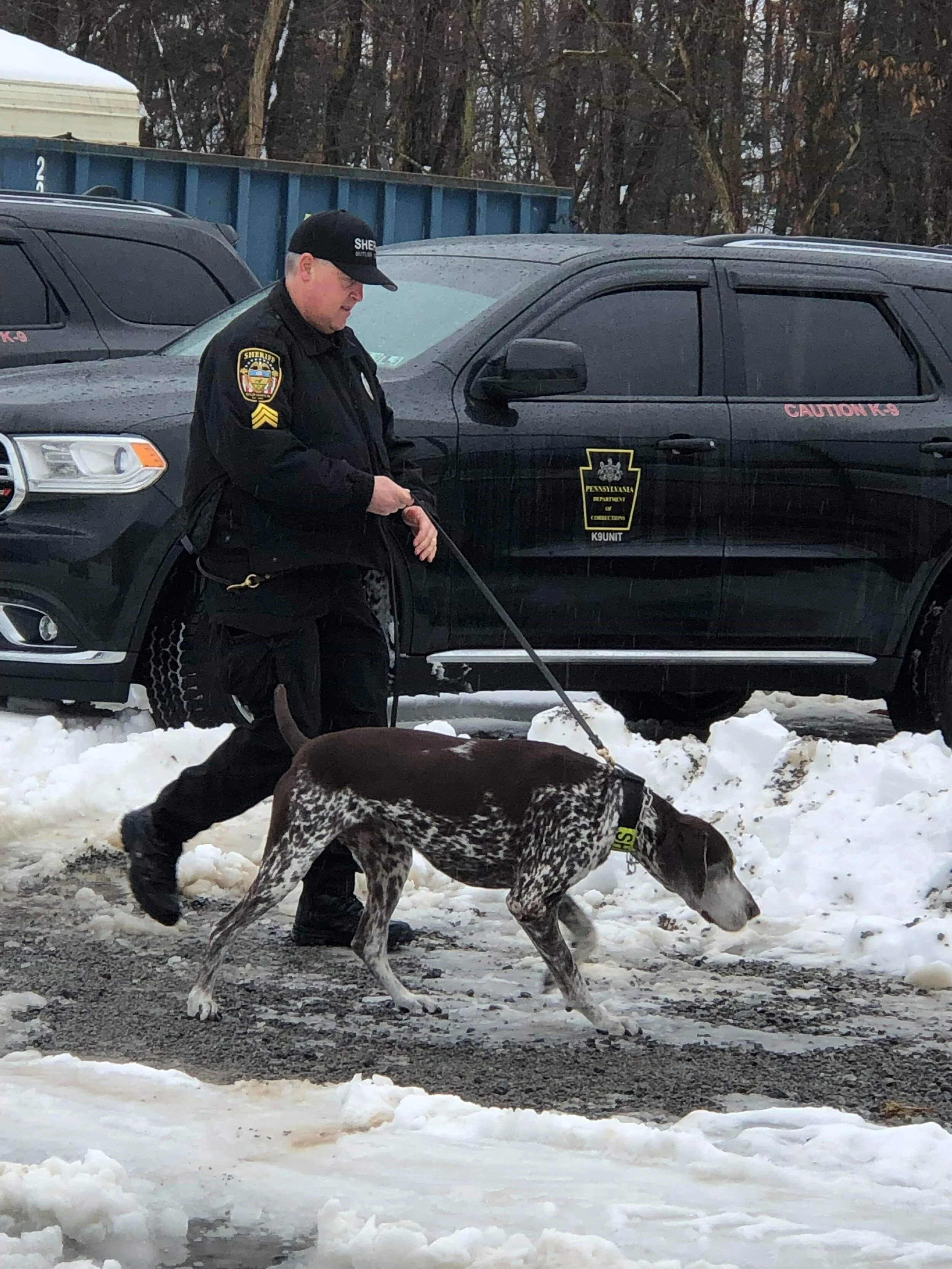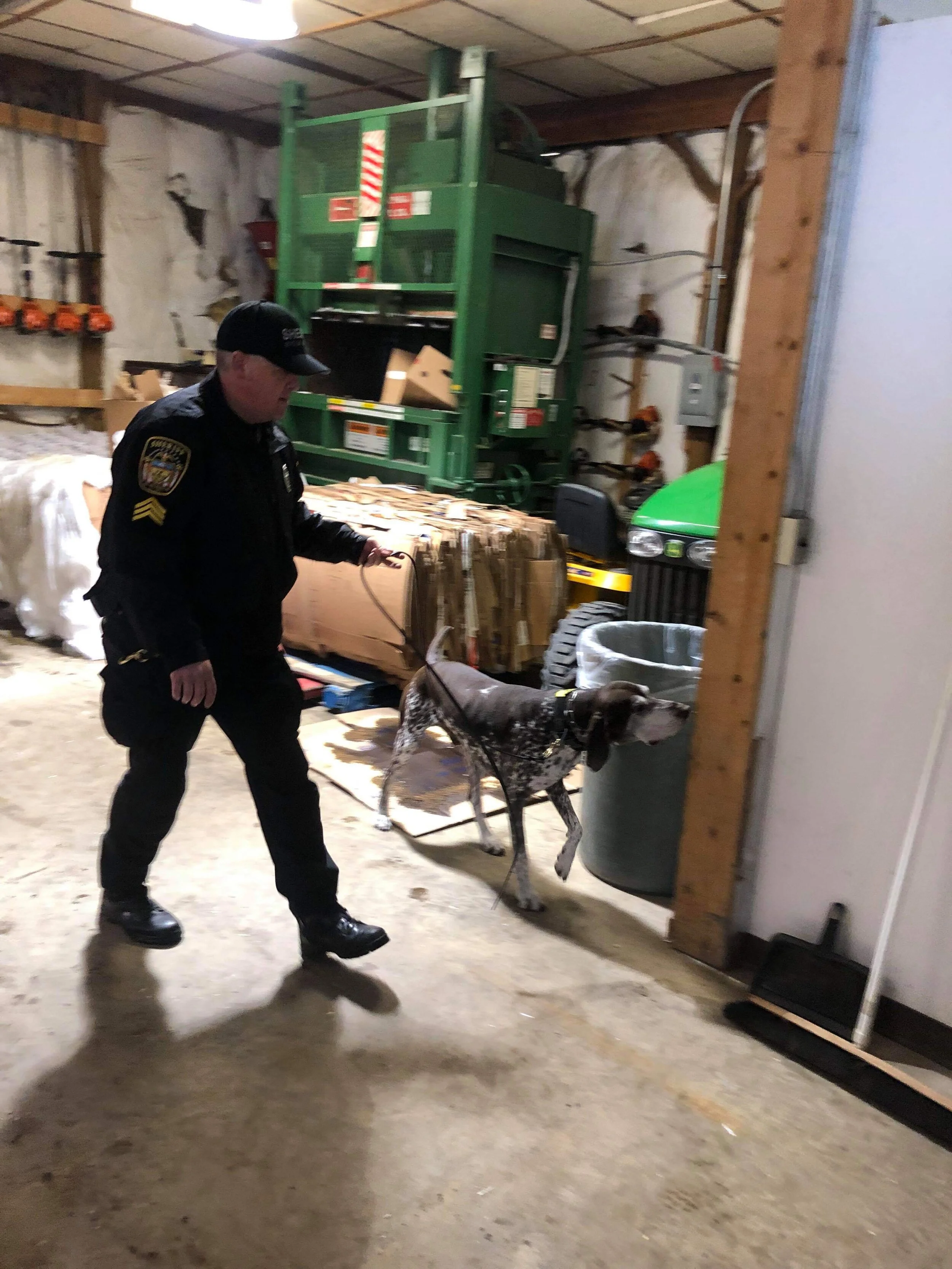Dog points toward different approach for K-9 work
Sgt. Harry Callithen and Bullet comprise a K-9 law enforcement unit. • Photos Submitted
By Tom Victoria
Bullet, a German short-haired pointer, aims toward a distinct type of law enforcement K-9.
The long-eared dog, working under the Butler County sheriff’s office in Pennsylvania, is intended for more social interaction than the typical police German shepherd.
Sgt. Harry Callithen, Bullet’s handler, said the canine’s purposes are drug detection and tracking missing people.
“The sheriff wanted a dog that was going to be approachable,” Callithen said.
Sheriff Mike Slupe agreed, saying Bullet’s dual tasks are providing another asset for law enforcement and community relations.
“I did not want an aggressive dog by nature,” Slupe said. “We’re not in a patrol function as a police department. I wanted a dog to be good with kids and people in general.”
Bullet and Callithen participate in D.A.R.E. (Drug Abuse Resistance Education) presentations.
“We’re going into the schools,” Callithen said.
The K-9 team also enters school buildings when locker searches are requested as well as a jail cell searches in the Butler County Prison.
Bullet also is called out for activities conducted by the Butler County Drug Task Force, so probable cause for search warrants can be established.
Among the missing person searches Bullet has undertaken since beginning his tour of duty in 2012 was a boy who wandered off into the woods in 20-degree temperatures.
“I did not want an aggressive dog by nature ... We’re not in a patrol function as a police department. I wanted a dog to be good with kids and people in general.”
Bullet undergoes different training than a German shepherd, which is taught to bite suspects in the arms and legs upon the command of its handler.
Under certain circumstances, a German shepherd is let loose. Bullet stays on a leash.
There are similarities between the breeds, though.
“Both are great hunters,” Callithen said.
Drug detection training includes sniffing out contaminated fabric hidden in the clothing of other deputies. Substances also are stashed in dog toys.
Bullet receives a reward, playing with a toy, each time there is a successful hit. The team trains 16 hours a month. Penn- sylvania state regulations require a minimum of eight hours.
Callithen said drug detection often requires dogs’ superior olfactory sense. Unlike marijuana and heroin, cocaine is harder to discern by human senses. Bullet’s sense of smell is 50 times that of a human’s.
Bullet, accompanied by Sgt. Callithen, checks the scents along the way.
During missing person searches, Bullet relies on ground disturbance odors, such as broken blades of grass, moss and leaves. The pointer also can detect the smell shoes leave on concrete.
Callithen said air currents and how wet conditions are play a factor in how much of the scent can be followed.
Bullet resides at Callithen’s home, but the dog is not the type to rest on his laurels.
“They need to stay busy,” Callithen said. “They need a job. They’re a dog not laying on your front porch.”
Bullet was put into service eight years ago. The sheriff acquired the dog through Shallow Creek Kennels in Hermitage.
Slupe said the implementation of the K-9 unit fulfilled his goals for the program.
“It’s worked out really well,” he said.
Callithen said he never anticipated becoming a K-9 officer before the opportunity arose. Now, he can’t imagine it any other way even when Bullet retires someday.
“I would do it again,” he said.



